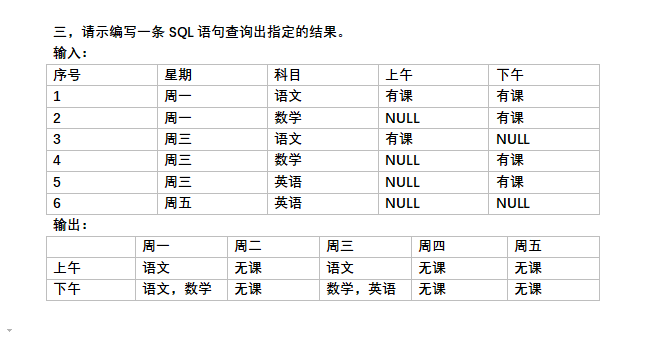可以将文章内容翻译成中文,广告屏蔽插件可能会导致该功能失效(如失效,请关闭广告屏蔽插件后再试):
问题:
I got an array (see below for one object in the array) that I need to sort by firstname using JavaScript.
How can I do it?
var user = {
bio: null,
email: \"user@domain.com\",
firstname: \"Anna\",
id: 318,
lastAvatar: null,
lastMessage: null,
lastname: \"Nickson\",
nickname: \"anny\"
};
回答1:
Suppose you have an array users. You may use users.sort and pass a function that takes two arguments and compare them (comparator)
It should return
- something negative if first argument is less than second (should be placed before the second in resulting array)
- something positive if first argument is greater (should be placed after second one)
- 0 if those two elements are equal.
In our case if two elements are a and b we want to compare a.firstname and b.firstname
Example:
users.sort(function(a, b){
if(a.firstname < b.firstname) { return -1; }
if(a.firstname > b.firstname) { return 1; }
return 0;
})
This code is going to work with any type.
Note that in \"real life\"™ you often want to ignore case, correctly sort diacritics, weird symbols like ß, etc when you compare strings, so you may want to use localeCompare. See other answers for clarity.
回答2:
Something like this:
array.sort(function(a, b){
var nameA=a.name.toLowerCase(), nameB=b.name.toLowerCase();
if (nameA < nameB) //sort string ascending
return -1;
if (nameA > nameB)
return 1;
return 0; //default return value (no sorting)
});
回答3:
If compared strings contain unicode characters you can use localeCompare function of String class like the following:
users.sort(function(a,b){
return a.firstname.localeCompare(b.firstname);
})
回答4:
Shortest possible code with ES6!
users.sort((a, b) => a.firstname.localeCompare(b.firstname))
String.prototype.localeCompare() basic support is universal!
回答5:
Nice little ES6 one liner:
users.sort((a, b) => a.firstname !== b.firstname ? a.firstname < b.firstname ? -1 : 1 : 0);
回答6:
underscorejs offers the very nice _.sortBy function:
_.sortBy([{a:1},{a:3},{a:2}], \"a\")
or you can use a custom sort function:
_.sortBy([{a:\"b\"},{a:\"c\"},{a:\"a\"}], function(i) {return i.a.toLowerCase()})
回答7:
We can use localeCompare but need to check the keys as well for falsey values
The code below will not work if one entry has missing lname.
obj.sort((a, b) => a.lname.localeCompare(b.lname))
So we need to check for falsey value like below
let obj=[
{name:\'john\',lname:\'doe\',address:\'Alaska\'},
{name:\'tom\',lname:\'hopes\',address:\'California\'},
{name:\'harry\',address:\'Texas\'}
]
let field=\'lname\';
console.log(obj.sort((a, b) => (a[field] || \"\").toString().localeCompare((b[field] || \"\").toString())));
OR
we can use lodash , its very simple. It will detect the returned values i.e whether number or string and do sorting accordingly .
import sortBy from \'lodash/sortBy\';
sortBy(obj,\'name\')
https://lodash.com/docs/4.17.5#sortBy
回答8:
Basically you can sort arrays with method sort, but if you want to sort objects then you have to pass function to sort method of array, so I will give you an example using your array
user = [{
bio: \"<null>\",
email: \"user@domain.com\",
firstname: \'Anna\',
id: 318,
\"last_avatar\": \"<null>\",
\"last_message\": \"<null>\",
lastname: \'Nickson\',
nickname: \'anny\'
},
{
bio: \"<null>\",
email: \"user@domain.com\",
firstname: \'Senad\',
id: 318,
\"last_avatar\": \"<null>\",
\"last_message\": \"<null>\",
lastname: \'Nickson\',
nickname: \'anny\'
},
{
bio: \"<null>\",
email: \"user@domain.com\",
firstname: \'Muhamed\',
id: 318,
\"last_avatar\": \"<null>\",
\"last_message\": \"<null>\",
lastname: \'Nickson\',
nickname: \'anny\'
}];
var ar = user.sort(function(a, b)
{
var nA = a.firstname.toLowerCase();
var nB = b.firstname.toLowerCase();
if(nA < nB)
return -1;
else if(nA > nB)
return 1;
return 0;
});
回答9:
In case we are sorting names or something with special characters, like ñ or áéíóú (commons in Spanish) we could use the params locales (es for spanish in this case ) and options like this:
let user = [{\'firstname\': \'Az\'},{\'firstname\': \'Áb\'},{\'firstname\':\'ay\'},{\'firstname\': \'Ña\'},{\'firstname\': \'Nz\'},{\'firstname\': \'ny\'}];
user.sort((a, b) => a.firstname.localeCompare(b.firstname, \'es\', {sensitivity: \'base\'}))
console.log(user)
The oficial locale options could be found here in iana, es (spanish), de (German), fr (French). About sensitivity base means:
Only strings that differ in base letters compare as unequal. Examples: a ≠ b, a = á, a = A.
回答10:
Inspired from this answer,
users.sort((a,b) => (a.firstname - b.firstname));
回答11:
A more compact notation:
user.sort(function(a, b){
return a.firstname == b.firstname ? 0 : a.firstname < b.firstname ? -1 : 1;
})
回答12:
You can use this for objects
transform(array: any[], field: string): any[] {
return array.sort((a, b) => a[field].toLowerCase() !== b[field].toLowerCase() ? a[field].toLowerCase() < b[field].toLowerCase() ? -1 : 1 : 0);}
回答13:
Pushed the top answers into a prototype to sort by key.
Array.prototype.alphaSortByKey= function (key) {
this.sort(function (a, b) {
if (a[key] < b[key])
return -1;
if (a[key] > b[key])
return 1;
return 0;
});
return this;
};
回答14:
also for both asec and desc sort, u can use this :
suppose we have a variable SortType that specify ascending sort or descending sort you want:
users.sort(function(a,b){
return sortType===\"asc\"? a.firstName.localeCompare( b.firstName): -( a.firstName.localeCompare( b.firstName));
})
回答15:
You can use the in-built array method - sort. This method takes a callback method as a param
// custom sort function to be passed as param/callback to the Array\'s sort method
function myCustomSort(a, b) {
return (a.toLowerCase() > b.toLowerCase()) ? 1 : -1;
}
// Actual method to be called by entity that needs sorting feature
function sortStrings() {
var op = Array.prototype.sort.call(arguments, myCustomSort);
}
// Testing the implementation
var sortedArray = sortStrings(\"Burger\", \"Mayo1\", \"Pizza\", \"boxes\", \"Apples\", \"Mayo\");
console.log(sortedArray); //[\"Apples\", \"boxes\", \"Burger\", \"Mayo\", \"Mayo1\", \"Pizza\"]
Key Points to be noted for understanding this code.
- The custom method, in this case,
myCustomSort, should return +1 or -1 for each element pair(from the input array) comparison.
- Use
toLowerCase()/toUpperCase() in the custom sorting callback method so that case difference does not affect the correctness of the sorting process.
I hope this is clear enough explanation. Feel free to comment if you think, more info is needed.
Cheers!
回答16:
in simply words you can use this method
users.sort(function(a,b){return a.firstname < b.firstname ? -1 : 1});
回答17:
You can use something similar, to get rid of case sensitive
users.sort(function(a, b){
//compare two values
if(a.firstname.toLowerCase() < b.firstname.toLowerCase()) return -1;
if(a.firstname.toLowerCase() > b.firstname.toLowerCase()) return 1;
return 0;
})


